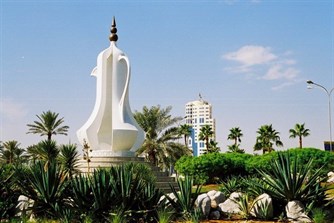Culture and Translation Services in Qatar
This blog touches on the importance of cultural awareness and languages when expanding your business into Qatar marketplace. It gives insight into Arabic language and everyday social interactions you may encounter whilst doing business or visiting this very modern and diverse country.
Defining culture
A society’s culture is a special quality about its people that makes them unique and creates a bond amongst them. Some of these qualities are its language, dress, codes of conduct, social norms, shared values even sometimes the ‘unwritten’ rules that create an identity for that society or that by which they are recognized or renowned. Culture extends to so much more especially in areas such as family values, religion, work and healthcare. We cannot properly define it, measure it or ignore it, it is integrated within our social and business circles and in order to truly adapt and experience a place we must embrace and accept it before we can accurately and appropriately attempt to translate our own message to a culture.
Facing the culture
Picture this…so you catch that big break to meet with the business director of that multinational corporation in Doha, Qatar. Weeks and weeks of calling and you finally get that 10 o’clock meet up at the head office. You get there at 9.45 am prompt…..can’t be late, right? Have to make a good impression. So you are in the lounge of the main office where there is a small cafe, tapping your feet, rehearsing what you’re going to say getting ready for that big pitch. You take a quick glance up at the clock on the wall, it’s now 10.25 am! You are wondering if you will still have a meeting or have time to make your pitch.

Finally, you see him, coming out of his last conference, in his full traditional wear, a long white thawb (sometimes commonly called the kandura). He greets you using the traditional greeting of “as salaam alaikum” (peace be upon you). Be sure you know and understand the response – “Walikum Salaam” (peace be onto you also). He offers you coffee or tea, then you sit down, immediately passing greetings about family, friends, the weather and that game of football last night. The conversation keeps going on and on like this. Before you know it the meeting is over and you haven’t said a thing about your company. So was your meeting a success, did you miss your opportunity to sell your product or services? You will find quickly in the Qatari culture, and many of the Middle Eastern cultures for that matter, that people want to know about you first. They want to build that trust before they speak about business or committing to even looking at your company profile and what you have to offer. They may actually prefer to meet over coffee in the lobby of a hotel or café, than schedule a formal meeting in their office. A meeting schedule is not really a schedule because sometimes it may start 30 minutes or even an hour later. Today that is as much a part of some cultures as it is the faster pace and greater demands on peoples’ attention with modern business. Phones are not necessarily put on silent as may be customary in the western world; they are kept active and ready to answer even while those important negotiations are going on. These all reflect cultural intonations that are influenced by the history of the country and social and business interactions.

A country’s culture is important to whom?
It is of course important to the citizens of the country, but if you live or work there, it has to be important to you as well. Why? Because, every personal interaction that you have with a local, being as easy as purchasing something for your apartment in a store or negotiating that next multi-million dollar or riyals contract, all revolves around what that person thinks about you, the trust that has been developed, whether you have truly connected with the person on different levels and his perception of your understanding, empathy and most importantly acceptance towards the local traditions.
Understanding the cultural environment of Qatar
Qatar, with a population of 1.69 million people, will be the first Arab state to host the FIFA World Cup in 2022. Approximately 20 percent of the population is Qatari nationals, with the remainder being expatriate employees. Doha is the largest of the cities in the country, where most of the population reside. Over the years, Doha has been hosts to several international business meetings and sports meets. The homes of Qatari citizens are distinct from the residences of expatriate employees. Many building designs incorporate architectural elements resembling desert forts and towers or have distinctively Islamic decorative styles executed in modern materials. Foods central to Qatar’s cuisine include the many native varieties of dates and seafood. Coffee is a central feature of the cuisine; it is Arabian coffee made of a lightly roasted bean that is sweetened and spiced with cardamom and served in small thimble-shaped cups to guests in homes and offices. Food and drink are always taken with the right hand as the left hand is considered as generally unclean. Gender roles are relatively distinct. Men engage in the public sphere more frequently than do women. Social behavior is conducted in a manner respectful of family privacy. One ought not inquire unnecessarily about another person’s family. Despite this strong sense of family privacy, however, it is considered rude not to extend hospitality to strangers. Tea, coffee, food, and a cool place to sit are offered to any visitor. Conversely, it is considered rude not to accept hospitality. Foreign visitors are expected to dress in a style that is sensitive to the culture, thus, conservative clothing is recommended. Friday is the Islamic day of rest. Most businesses and services are closed on Fridays. All government offices, private businesses, and schools are also closed during Eid al-Fitr and Eid al-Adha. Especially in the business arena, you will find that men are very talkative and conversations can be very emotional and animated!
Making sure you address culture with translations
You want your message to be received in a professional, clear, crisp and concise manner and appeal to your audience in the right way, else as the old saying goes….”it becomes lost in translation.” Culturally correct translation, termed “localization”, ensures that you are reaching out to your target audience, grabbing their attention, connecting emotionally and almost as if the written text speaks to that person. This called copywriting in another language sometimes called “trans-creation”. Translation services need to capture accurately the meaning of the source language content, but carefully craft the message in the target language to ensure it “feels” like the content was originally composed in the native language of your audience.
Other Considerations when localizing content into Arabic:
- The use of Images-Be sensitive in your selection of imagery for your company profiles, brochures as well as on your public facing website to ensure they are culturally appropriate based on your target country/culture.
- Symbols and Icons: An Islamic country such as Qatar utilizes several symbols and icons that denote special cultural meaning. It is important to be aware of them in order to avoid any cultural blunders and inadvertent use of offensive symbols.
- The Use of Colour: Colours also represent specific meaning and symbolize aspects of Qatari culture. For example, green means Holiness or luck, blue – immortality, yellow Strength, reliability, happiness, and prosperity, red means evil or danger, white means purity or mourning
These cultural and aesthetic factors should be taken into consideration when localizing content for your website and documents into Arabic. “These examples are from a great resource for understanding the implications of culture on global websites, a book by Professor Nitish Singh, PhD., entitled, The Culturally Customized Website.”
Arabic Translation Services
GPI provide Arabic translation and localization services by Arabic native translators, proofreaders and copywriters who have solid experience with Middle East market requirements and cultures.
Check our Arabic Translation quick facts and resources for more information:
- The Arabic Language
- Arabic Document Translation
- Arabic Translation Services
- Arabic Website Translation
